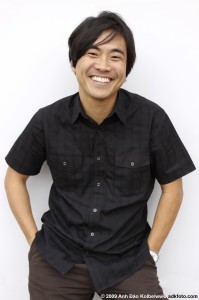
Lee Herrick is the author of This Many Miles from Desire (WordTech Editions). His poems have appeared in many literary magazines and anthologies, including The Bloomsbury Review, ZYZZYVA, Highway 99: A Literary Journey Through California’s Great Central Valley, 2nd edition, and One for the Money: The Sentence as Poetic Form, among others. Born in Daejeon, South Korea and adopted at ten months, he lives in Fresno, California and teaches at Fresno City College and in the low-residency MFA Program at Sierra Nevada College.
***
LR: One of the themes in This Many Miles from Desire that stood out most to me is the notion of the liminal space. There is, for example, the dream space of such poems as “Three Dreams of Korea: Notes on Adoption,” the physical space of travel—of being in between here and there, linguistic space, and also spiritual space. Could you talk a bit about how you envisage this relationship between space and liminality in your work?
LH: When I wrote This Many Miles from Desire, I had only been back to Korea once since being adopted. My return was very brief–two days–and that return formed “Korean Adoptee Returns to Seoul.” Since then I have been back for longer periods of time, but the vast majority of This Many Miles from Desire was written in a time where Korea was one large, complex question in my mind. I did not know most of the major details of my early life: the day I was born, who my birth family was (I still don’t), or even what cities like Seoul or Daejeon looked like. In one sense, I felt fully alive, but in another sense, there were so many uncertainties. For example, I do not know my family’s medical history, so that contributed to the sense of liminality to which you refer. My adoptive family is my family, and we are very close. But national origins are vital, so much of the book explored that territory. You can see it in some of the poems. I was on a journey, literally traveling through Latin America and Asia and piecing together remnants of the world to reduce the gaps between my early years and who I had become.
“Three Dreams of Korea: Notes on Adoption” was a breakthrough for me both as a person and as a poet because it was one of the first poems I ever wrote about my adoption. The important part of the process was when I discovered Richard Hugo’s The Triggering Town, essential reading for any poet, in which he problematizes the often used teaching phrase, “write what you know.” I was rather paralyzed, then, because I did not know (about my birth country, my birth family). I couldn’t reference the streets, the food, the people, the sounds of my country. So it was a major turning point for me when Hugo says we should invent. You do not necessarily have to “know” (literally) to write the poem. We can imagine. And so I did. In “Three Dreams of Korea,” I even imagined the dreams. I never had those three dreams. I created them for the poem’s sake. It was incredibly liberating. We write in the direction of discovery. Maybe we float in and out of various states of knowing, and our poems represent that floating. Continue reading “A Conversation with Lee Herrick”